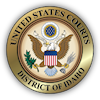 THURSDAY, OCTOBER 23, 2025
THURSDAY, OCTOBER 23, 2025 IMAGE: "Sawtooth National Forest - Stanley, Idaho"
U.S. DISTRICT COURT
District of Idaho
Chief Judge David C. Nye
Public 2 New

 THURSDAY, OCTOBER 23, 2025
THURSDAY, OCTOBER 23, 2025 Chief Judge Nye is generally receptive to an initial request for the continuance of a trial setting by the defendant.
A request for further continuances will be closely scrutinized and may well be denied.
Requests for continuance should be supported by an affidavit and should set forth facts from which the Court can conclude whether the requested continuance would support a finding of excludible time under the Speedy Trial Act.
Most criminal cases are resolved by plea agreement. Last minute plea agreements pose a significant challenge for any judge managing a busy trial docket. For that reasons, Chief Judge Nye expects that all plea negotiations will have been completed prior to the time of the Trial Readiness Conference, which is typically scheduled two weeks before trial.
Chief Judge Nye uses the Struck Jury System for jury selection.
Chief Judge Nye conducts most voir dire of the jury panel, but allows counsel 20-30 minutes each for follow-up. Counsel are encouraged to submit proposed questions for Chief Judge Nye to use in his voir dire of the jury.
Trials will typically begin on Monday at 1:30 p.m. Thereafter, trials will be conducted Tuesday through Friday from 9:00 a.m. to 5:00 p.m., with two 15-minute recesses per day and a one-hour lunch recess.
Witnesses must be disclosed in accordance with procedural order deadlines. In addition, the AUSA trying the case must provide defense counsel at the beginning of the trial with a rolling list of the witnesses they expect to call, and the order in which they will be called. The list must be updated so that defense counsel are aware of any changes in the order of witnesses, at least 36 hours in advance.
Objections to the presentence report must be in writing and submitted by the date ordered.
Motions for departure should be filed on or before the date objections are due.
Counsel are provided with copies of all sentencing materials and recommendations provided to the Court by the Probation Office.
The final report is sealed by the Court after sentencing. Disclosure is limited by Federal Rule of Criminal Procedure and Local Criminal Rule 32.1.
The sentencing in a routine case will be scheduled for 45 minutes. If counsel feels that extensive evidence will be presented or that additional time is necessary, they should contact the Courtroom Deputy at least 2 weeks before the scheduled sentencing date.
Sentencing memoranda are not required.
If submitted, memorandum should be filed at least seven calendar days before the sentencing date.
Letters of support should be submitted to the Presentence Investigator.
Victims and individuals speaking in support of a defendant will be allowed to address the court without being placed under oath. However, individuals whose statements may bear upon a sentencing guideline issue, must be placed under oath and subject to cross examination.
This site provides access to the federal rules and forms in effect, information on the rulemaking process and historical and archival records.